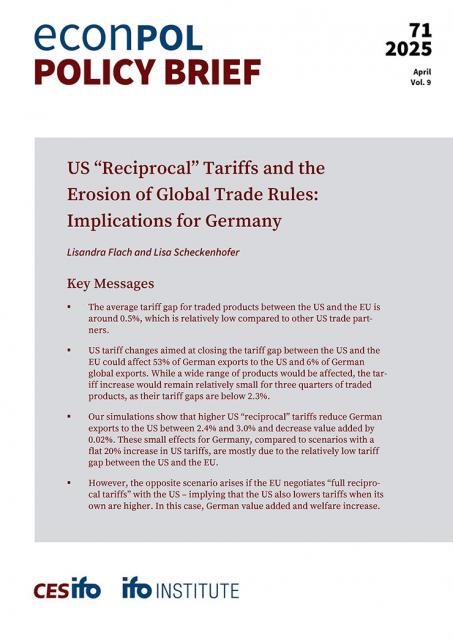News Archive

COVID-19: The World Economy Needs a Lifeline – But Which One?
|
EconPol Policy Brief
| News
Dorine Boumans, Sebastian Link and Stefan Sauer (EconPol Europe, ifo Institute) surveyed 1000 economic experts in 110 countries on the economic effects of the COVID-19 pandemic and the effectiveness of different policy measures to combat the crisis for different countries.

ESM Liquidity Assistance Versus Corona Bonds
|
EconPol Policy Briefs
| News
In the search for the right European financing instruments, the purported advantages of corona bonds over the ESM are meagre to non-existent, says Friedrich Heinemann (EconPol Europe, ZEW): the challenge we face is to contain the spread of COVID-19 while stabilising the economy and ensuring eurozone states have sufficient liquidity, and the ESM is a suitable tool for pursuing these ends.

EU Solidarity in Exceptional Times: Corona Transfers Instead of Coronabonds
|
EconPol Opinion
| News
Does the coronavirus crisis call for solidarity within the EU, or within the euro area: Daniel Gros (EconPol Europe, CEPS) argues that being hit by an unforeseen epidemic has nothing to do with euro area membership and the present situation is a case which requires solidarity at EU level. And, he says, there's a plausible and simple way to organise a real expression of EU solidarity without engaging in any large-scale financial transactions.

Group Testing Against Covid-19
|
EconPol Policy Brief
| News
In this paper, Christian Gollier (EconPol Europe, Toulouse School of Economics University of Toulouse- Capitole) and Olivier Gossner (CNRS – CREST, Ecole Polytechnique, London School of Economics) show how group testing can be optimized in three applications to multiply the efficiency of tests against Covid-19: Estimating virus prevalence to measure the evolution of the pandemic; bringing negative groups back to work to exit the current lockdown; and testing for individual infectious status to treat sick people.

The Economic Costs of the Coronavirus Shutdown for Selected European Countries: A Scenario Calculation
|
EconPol Policy Brief
| News
This paper presents scenarios of the shutdown costs related to Covid-19 in terms of lost value added for Austria, France, Italy, Germany, Spain, Switzerland and UK: the shutdown phase will lead to considerable production losses and large declines in GDP this year and, lasting longer than a month, the losses within the EU quickly reach dimensions well beyond the growth slump of previous recessions or natural disasters.
